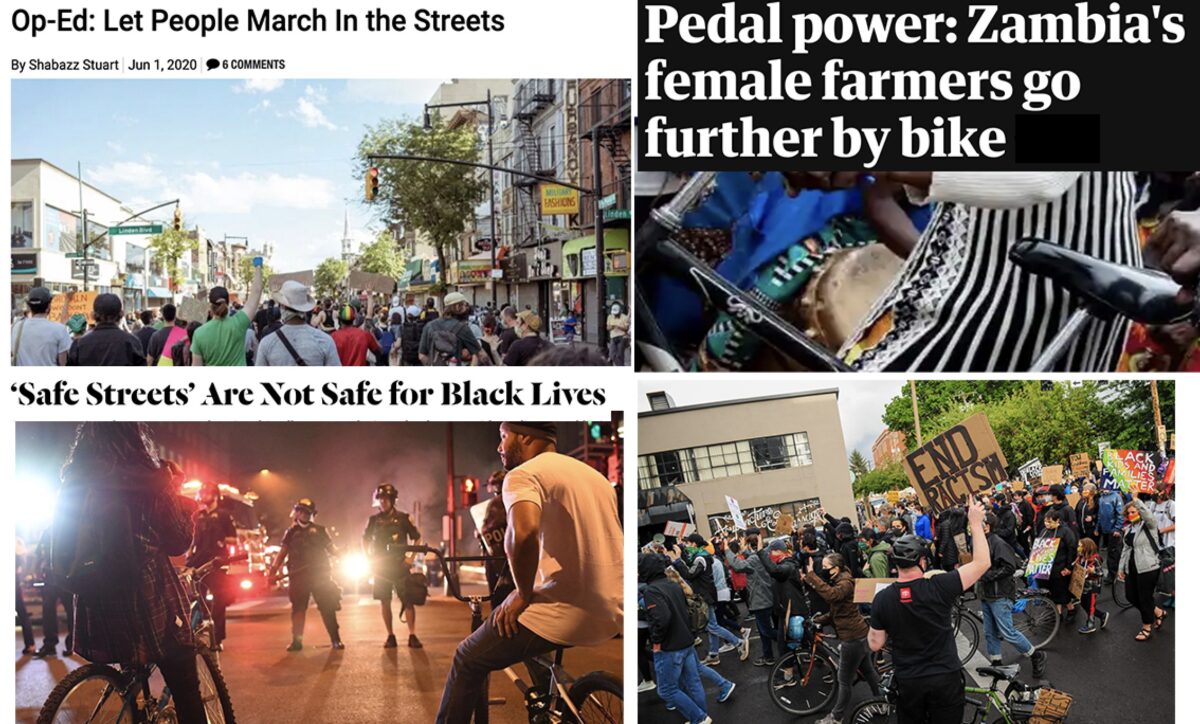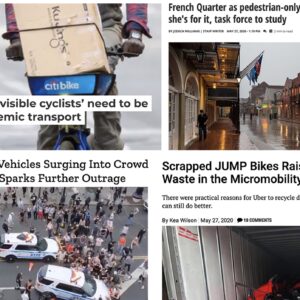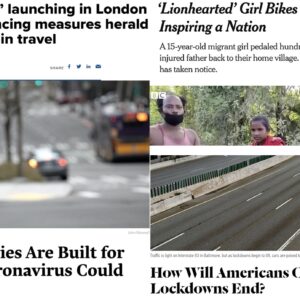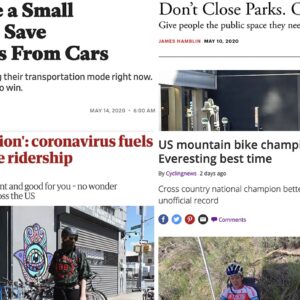Welcome to the week.
Here are the most noteworthy items our community came across in the past seven days…
Vehicular violence: A man drove his car into protestors in Seattle last night in what is just the latest in a worrying rise of vehicular violence across the country.
Safe streets for whom?: Anthropologist and planner Destiny Thomas says transportation and urban planning, “Must no longer exist in service of white comfort, with no regard for the bodies that carry the burden of protest when Black lives are lost in the streets.”
Path rage: A 60-year-old white man riding on a popular bike path in Washington D.C. assaulted several teens who were putting up posters related to the killing of George Floyd. After a video of the incident went viral he was found and arrested.
Stranded: Whether to suspend transit service during a major protest is a much more difficult decision than you might think.
Bikes in Africa: This photo gallery of Zambian women farmers who use bicycles to cart their products to market will brighten your day.
Police reform now: In a massive development that illustrates the power of protest, Minneapolis city council is poised to dismantle their existing police force.
Open streets: Shabazz Stuart argues in Streetsblog that streets play a vital role as gathering spaces during demonstrations and governments should not impinge our right to march on them.
Advertisement
Police bikes: As police nationwide use their bicycles as weapons against protestors, the parent company of Fuji Bikes announced they’d end sales to law enforcement agencies. Fuji now says they’re in talks with police leaders about the issue.
Transportation and racism: “There is not one issue, problem or system that we work on in social justice/civil rights or in policymaking that does not encompass ending racism,” says Dara Baldwin in this persuasive essay aimed at transportation reform advocates.
Shut it down: People who live on the North Portland Peninsula shut down the St. Johns Bridge Sunday, and used the carfree space to dance and chant against racism and police brutality.
Cycling’s big moment: “Turning cities like London or New York into so many Copenhagens will be less of a sprint, more several Tours de France,” says The Economist in this story about the pandemic-fueled global bike boom.
Thread of the Week: Some local and well-known transportation planners weighed in on this question posted by planner and researcher Charles Brown about white silence.
Serious question: Why are some White allies (individuals & organizations) who work in urban planning comfortable speaking out against injustices while others aren’t? Please weigh in… #equity #nofilterneeded
— Charles T. Brown, MPA, CPD (@ctbrown1911) June 1, 2020
— Jonathan Maus: (503) 706-8804, @jonathan_maus on Twitter and jonathan@bikeportland.org
— Get our headlines delivered to your inbox.
— Support this independent community media outlet with a one-time contribution or monthly subscription.








Thanks for reading.
BikePortland has served this community with independent community journalism since 2005. We rely on subscriptions from readers like you to survive. Your financial support is vital in keeping this valuable resource alive and well.
Please subscribe today to strengthen and expand our work.
It seems like what the pandemic bike boom emphasizes more than anything is that the main thing holding mass adoption of cycling back the is fear of being killed or injured by careless clowns in speeding automobiles. So we can’t just promote cycling we have to work to phase out the scourge that is the private automobile. The earth and its future inhabitants will thank us.
Following the Streetsblog link to Shabazz Stuart’s article, I also saw this:
https://nyc.streetsblog.org/2020/06/04/its-not-your-bike-anymore-police-swipe-bikes-at-black-lives-matter-march/
https://www.defundbikepolice.com “A tool of freedom or violence” discusses the militarization of Bike Police and their bikes and how they have become a focal point of the overwhelmingly unproportionate violent response to peaceful protest, and includes a link to a petition to defund all such units. Read the page and come to your own conclusions.
Me, I’d like to see all police bike manufacturers step up like Fuji. Hey Trek, how does the cover image on that page make you feel? Seeing your logo literally violently shoved into the faces of those just asking for equality?
A few thoughts about Minneapolis’ vote yesterday to “dismantle” our PD:
– This is a commitment to change, not yet a specific proposal to shut down the department right away. It will take months of planning and years of execution.
– Contrary to frantic spin in the right-wing mindspace, it does not mean we are going to be completely without an armed law enforcement presence, with criminals roaming the streets and victimizing people at will. Of course it will be sometimes be necessary to send in armed officers. Duh. Whether this means shutting down our department to get out from under the oppressive police union contract and reconstituting a new, smaller city-led force, or reverting to the county for enforcement, is not yet clear. Camden and Compton both did the latter, but that doesn’t mean it’s what we will do.
– I admit I went “huh?” when I first heard calls for “dismantle,” “defund” and “abolish” two weeks ago. Turns out communities of color have been proposing reimagined public safety departments for years. MPD150.com, which examines the sordid 150-year history of the MPD and has (sometimes vague) answers to frequent questions, is a good starting point.
– Police defenders have always been complaining that officers often end up being more social workers than law enforcers, and they’re not trained for what they have to do. Okay, let’s send in people who are trained for it: a lot of 911 calls could be better answered by social workers, or psychologists, or dogcatchers, or relationship counselors. In particular to that last idea, sending law enforcement to every “domestic disturbance” disincentivizes victims of domestic abuse from seeking help early, before things spin out of control. Having an easier way for victims to seek help without automatically escalating to law enforcement could actually make a dent.
– Of course the question “how you gonna pay for it?” rears its head, but consider this: the Minneapolis Police Department’s annual budget is $193 million (not including the contract work they do for various organizations around town). LAPD’s is $2 billion. NYPD’s is $5 billion. Those are staggering amounts of money, which means police agencies are staggeringly inefficient at keeping the lid on crime. There is definitely room to redirect some of that funding to efforts that will produce better results for less money.
Your first bullet point is precisely why I don’t like the term “abolish the police” in this scenario; it implies that nothing would be done to replace it, which is false. Instead, I wish people would use the term “replace the police”; it emphasizes that we’re not just removing the department with no replacement, but instead getting other agencies to take up the slack.
Another ‘bullet’ point:
-Give jobs to people who won’t sign on for the ever-ready progression to lethal violence.
I agree that social workers are better positioned to handle any number of calls currently answered by police. But the first time a social worker is stabbed to death by a deranged callee, there will be demands that the city provide armed security to accompany social workers on their calls (so police staffing levels won’t really fall too much).
And the first time a woman is killed by her husband after the social worker leaves (because the social worker did not make an arrest, because they’re a social worker, and the woman forgives her husband because he’s really a good person who just gets angry sometimes) there will be calls to have the armed security there as well (anyone over 35 or so will know we’ve been down this road before — this is why the police are required to make an arrest on every domestic abuse call).
And at those times when there are too many calls and not enough social workers, the armed security will go without the social worker, and we’ll end up in the same situation as today.
And in order for the “social work” model to function, it needs to be backed by a much better resourced mental health and drug treatment system. We definitely need this, but the police budget isn’t big enough to do more than help with a down payment.
What I see is that “defund the police” really translates into much more spending overall in order to achieve a different set of outcomes, and we’re not even getting into the prevention side of things. I’m totally ok with this, but it’s going to take a lot of money, and the notion that we’ll get enough by “taxing the rich” seems fantastical.
If we want broad social change, we need to be willing to pay for it, ourselves. It will not be cheap. That means YOU will be paying higher taxes, and there will be a lot of resistance from people who don’t want to pay more, especially not to fund social programs that don’t always have good outcomes (because no social program always has good outcomes). Some of those who won’t want to pay more may well be out on the streets protesting for change right now.
“Defund the police” is a great protest slogan, but in practice it will take a lot of of careful thought and planning and money and political commitment, and it will almost certainly require constructive participation from the police themselves.
At this point it’s hard to say what rebuilding the police department will look like and how much of its function might shift to other agencies. Agreed that there will be big challenges. Even this is effectively a tactic to get out from under the current police union and we still end up with a substantial armed force, that allows for a lot of reform that we can’t do currently. As one example, the citizen oversight board set up here in the 1970s got dismantled in the 1980s thanks to state legislation pushed by MPD’s union.
Which brings me to state laws. We have a long list of reforms on the agenda that are not currently possible under state law. This highlights why we need people from all areas and walks of life, even those who don’t live in Portland or Minneapolis or areas with significant numbers of people of color, to push for systemic change. In both Oregon and Minnesota, state laws often have been roadblocks to reform. Getting these laws changed requires constituents from across the state to pressure their legislators.
Even if it’s just a anti-union ploy, what’s the plan? The armed security is (whether we call them the police, sheriff, or citizen patrol, and whether they’re under control of Minneapolis or Hennepin County, where political responsibility is more diffuse than at the city level), like every other body of public employees, is going to be unionized. And their union, like all unions, is going to go to bat for its members, even when they do bad things (accusation is not conviction, after all), lobby for favorable laws, etc. Which is how we got to where we are today with police unions protecting people who really need to gone, now.
The best outcome I can see is that the city/county/state/whomever establish a framework under which law enforcement is held to account by other legal jurisdictions. An independent investigator for all credible accusations of misconduct, for example. This will likely involve changes to the law (reducing qualified immunity (which might not even be a good idea if you want people willing to take risks to protect civilians), or making it easier to fire rogue employees). All of which we can also do without defunding the police or even getting rid of the union, with sufficient political will (and which might require less political capital than demolishing the police institution wholesale).
Maybe we don’t want this body of employees to be protected by a union at all (and, perhaps, we could pass a law to prevent it); but that just introduces another class of problems where employees have no collective protection against abusive management. It’s not clear to me that even if such a law would be legal (freedom of association and all that), that it would be desirable (but I’ll leave that question to the labor historians).
It might be that I lack the imagination to picture a different world. But it might also be that the system has evolved to what it is for some good reasons (but I am NOT saying the system is good), and that evolutionary improvement might be better than revolutionary overthrow.
The other thing I’ll mention is that none of us has yet heard from anyone opposed to change; I believe there are many people out there who are satisfied with the status quo (or even want the police to have a stronger hand to quell disruptive protest) who will be able to frame their objections to change much more powerfully than what I wrote here. Crime victims (as traditionally construed) are particularly sympathetic, and have often lobbied for stronger police powers and reduced rights for the accused. I’m guessing we’ll hear a lot more from them in the weeks ahead as this conversation progresses.
I used to read a tech site, which had a running joke about business plans that weren’t fully fleshed out:
1. Defund the police
2. ???
3. Profit!!
I feel that describes our current situation.
The plan is by definition not set yet. Sunday’s council vote establishes ‘dismantling’ (which can mean a lot of different things to different imaginations) as a goal. The plan will be put together over the next few months by working with the community. Although there will certainly be opposition, particularly from wealthy neighborhoods, we are finding very strong support for radically changing the police even in our fairly well-off, mostly-white neighborhood (think East Tabor). Perhaps one factor in this was the killing of Justine Damond a couple years ago, which woke up a lot of complacent white people to the danger posed by the police.
Fuji is one of those Taiwanese companies like KHS and Giant that produces bikes for other unrelated brands. I have a cheap Fuji 29er MTB hydroform aluminum frame from a bike I bought at Performance, then stripped down and rebuilt as a fast 1×10 bike – it works quite well.
From https://www.policebikestore.com/:
We have a large selection of Fuji bikes in stock in our warehouse that are ready for immediate shipment.
For over 15 years, we have been committed to serving the Law Enforcement Community with quality Police Bikes and Accessories. We can provide your department with as many bicycles as required. Whether you need one bike for a single patrol officer, a dozen bikes for a unit, or hundreds for an entire base or force, we can supply you with quality mountain bikes and accessories that are specially designed for the day-to-day riding and demands that a Police officer places upon a bike.
Although our main focus is Law Enforcement, we also regularly supply EMS, Park Ranger, Security and all other types of bike patrols.
In addition to Police Bikes, we also offer a complete line of Accessories. We work factory direct with many of the brands we carry which allows us to offer high quality products, designed specifically for bike patrols at very affordable prices.
Why Does A Department need a Police Bicycle Division?
A bicycle allows a police officer or security agent to be closer to the people, and to travel where cars can not reach. This can be great for downtown areas and public events, where a bicycle allows an officer to see more of their surroundings and what is occurring. The visibility of a bicycle patrol can reduce crime and is a very stealthy way to approach people not expecting law enforcement to be on a bike. A bicycle division is great for morale, fitness, and also provides the officer with the ability to interact with the community on a more personal level.
The Destiny Thomas article is interesting. That said, I do not understand this:
Racial profiling from traffic stops has been a huge problem forever! Philando Castile, Walter Scott, and Sandra Bland all died after traffic stops… George Floyd was also in his SUV when the police encountered him. Perhaps there is evidence that being in a car protects Black people from police violence, but it is definitely not so obvious that you can just assume it’s true.
Another thing about that is we have less than a decade to turn our climate situation around; if we have to first eradicate racism before we can start cutting back on private vehicle usage… well, that’s just not going to work.
Doubt anyone will see this but seems pertinent. https://twitter.com/yfreemark/status/1270362572781477888
Black and Asian commuters are more likely than white commuters to take transit.
Latino commuters are more likely to walk or ride a bike. Black households are 3x more likely to not have a car. Focusing on driving trips at the expense of walking and transit is basically just using public policy to help white people.
The assumption is that if the police can’t see you inside your car, they won’t arbitrarily pull you over. But the police never look in your car window in the first place as it’s a waste of their time; instead they scan your license plate number while you are driving and discover your race, gender, police record, past infractions, home address, and lots of other information you probably wouldn’t tell your employer let alone voluntarily give to the police. In fact, if you want to preserve your privacy, driving is the worst way to travel.
The Zambia story is pretty awesome.
Hit a paywall with the Economist article.
That article about the cyclist assulting kids was super sad. Then I saw this one… Interesting if you use Strava… Or just like to ride your bike and mind your business.
https://nymag.com/intelligencer/amp/2020/06/what-its-like-to-get-doxed-for-taking-a-bike-ride.html
I always knew it was a bad idea to use Strava.